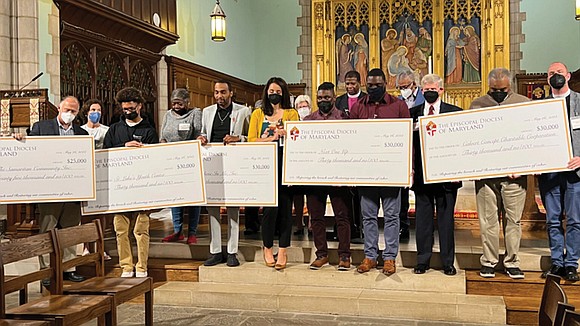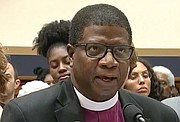Episcopal Diocese of Maryland distributes $175,000 in reparations grants
Adelle M. Banks/Religious News Service | 6/2/2022, 6 p.m.

The Episcopal Diocese of Maryland has made an inaugural grant distribution of $175,000 after church members overwhelmingly approved a reparations fund a year and a half ago.
“The applicant pool was large and filled with worthy organizations doing the work of restoring Black communities in the geographical area of the Diocese of Maryland,” said the Rev. Christine L. McCloud, the diocese’s canon for mission, in a statement announcing the grants.
Speaking at an awards ceremony in Baltimore on May 26, Bishop Eugene Taylor Sutton said the awards’ distribution represented the triumph of action over debate.
“Many people in the United States wonder, ‘Why reparations? I did not own slaves and maybe my family didn’t own slaves and I love everyone,’” said Bishop Sutton, the Maryland diocese’s first African-American bishop. “Today is part of that answer. The legacy of 350-plus years of discrimination against persons of African descent have taken a toll on this nation and it has affected all of us. All of us.”
Bishop Sutton encouraged others to “return some of the wealth that has been accumulated over 350 years and return it to African American communities.”
In September 2020, a diocesan convention voted, with 82.5 percent of 220 delegates approving, to create a $1 million “seed fund for reparations.”
“It’s more than that now, not because of the stock market, as we all know, but because of continuing contributions to that fund of people from all over the state, Episcopalian or non-Episcopalian,” said Bishop Sutton at the ceremony, “saying we want to be a part of this; we want to be a part of efforts to address housing inequality, education inequality, poor health care, environmental degradation and the need for micro economic justice.”
In 2019, the diocese’s convention voted to study reparations and urge congregations to “examine how their endowed wealth is tied to the institution of slavery.”
When that measure passed with no dissenting votes, Sutton said that it brought tears to his eyes as he realized the delegates, representing a membership that is 90 percent white, “got it.”
“They get this thing called justice, and when you put it in a frame that there is a basic injustice in this nation of steal- ing from generations of people and that has a direct effect on today, then people,” Bishop Sutton said in a 2019 interview, “they say, ‘OK, we got to get that fixed.’”
The diocese named six organizations as the inaugural grant recipients. They include:
• Anne Arundel Connecting Together, which will use its $30,000 award to gain participants in a new “Turnaround Thursday” program to aid public housing residents and formerly incarcerated individuals in finding jobs that may lead to increased salaries and career development.
• Calvert Concept Charitable Corporation, whose $30,000 grant will be used to address social injustices and enhance racial reconciliation by fostering business and home ownership for “people whose family histories are rooted in enslavement.”
• I Believe in Me, whose $30,000 grant will be used to instill self-esteem in at-risk youth, offer math and reading programs, and pay costs of pre-construction for the organization’s new permanent location.
• Next One Up, whose $30,000 award will provide long-term coaching and mentoring to 12- to 15-year-old African-American boys to foster economic and academic success.
• St. Luke’s Youth Center, which will use its $30,000 award to develop a campus for education and art and provide economic and family care opportunities for West Baltimore communities.
• The Samaritan Community, which will use its $25,000 award for empowerment programs and crisis intervention assistance such as food, counseling and housing assistance to African-American clients.







